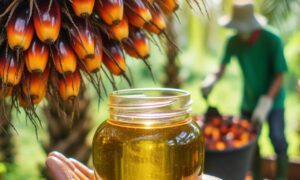Zero Tariff On Palm Oil Will Raise Malaysia’s Competitiveness In US Market

The Malaysian Palm Oil Council welcomed the U.S. decision to grant zero tariffs on Malaysian palm oil under a new trade agreement, calling it a major boost for exports. Palm oil shipments to the U.S. rose 8.1% to 346,000 tonnes this year, driven by strong demand, sustainability certification, and downstream expansion.
The Malaysian Palm Oil Council (MPOC) has welcomed the United States’ decision to grant tariff exemptions for selected Malaysian products — including palm oil — under the newly concluded Agreement on Reciprocal Trade, describing it as a timely boost for the industry and bilateral trade relations.
The move comes amid strong trade performance between the two nations, with Malaysia’s palm oil exports to the U.S. recording steady growth over the past two years, driven by increasing demand from advanced manufacturing and consumer goods sectors.
MPOC Chief Executive Officer Belvinder Sron said the zero-tariff measure would further enhance Malaysia’s competitiveness in the American market.
“The zero-tariff for Malaysian palm oil is a positive development. Our exports to the United States have recorded strong growth over the past two years, and this measure will further strengthen Malaysia’s competitive position in a high-value and rapidly evolving market,” she said.
Belvinder added that deeper commercial cooperation between Malaysia and the U.S. will benefit both nations, particularly through downstream expansion and technology integration within the palm oil industry.
From January to September 2025, Malaysia’s palm oil and palm-based product exports rose 8.1% to 346,000 metric tonnes, compared to 320,000 metric tonnes in the same period last year. Certified palm oil led the increase, climbing from 75,000 to 98,000 metric tonnes, now accounting for 79% of Malaysia’s exports to the U.S.
These products, including palm stearin, are widely used in high-value industries such as specialty food manufacturing and personal care products, where alternative raw materials remain limited — underscoring Malaysia’s growing role in global supply chains.
Belvinder highlighted that Malaysia’s sustainability frameworks, including the Malaysian Sustainable Palm Oil (MSPO 2.0) certification and the Sawit Intelligent Management System (SIMS), have strengthened transparency and traceability, allowing local producers to meet stringent buyer standards in advanced markets like the United States.
“These initiatives enhance Malaysia’s ability to integrate seamlessly into international supply networks while positioning our exporters for greater participation in value-added and premium segments,” she said.
While the U.S. tariff exemption marks a key milestone, MPOC reaffirmed its commitment to diversifying export markets to maintain long-term growth and resilience. It identified Sub-Saharan Africa (SSA), the Middle East and North Africa (MENA), and ASEAN as continued focus regions due to growing demand for edible oils and palm-based downstream products.
“Our diversification strategy remains a core priority to ensure sustained success for Malaysian palm oil globally,” Belvinder said.
With improved tariff conditions in the U.S., a stronger downstream base, and ongoing market expansion, MPOC expressed confidence that Malaysia will sustain export growth and reinforce its reputation as a reliable trade partner on the international stage.
To Read more about Edible Oil News continue reading Agriinsite.com
Source : Business Today














